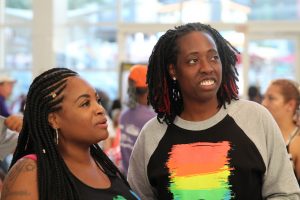- Slug: Sports-Mercury Pride Night, 700 words
- Photos available
By SARA HATTIS
Cronkite News
PHOENIX — On Sunday, Phoenix Mercury guard Diana Taurasi broke the WNBA’s all-time scoring record. A month earlier, she was celebrated for a different achievement: appearing on the cover of People Magazine with former teammate Penny Taylor.
It was a picture of the couple on their wedding day.
Before their marriage, the two were not public about their relationship. The new attention could help others be more comfortable sharing who they are, Mercury teammates said.
“I think in the past or what not it wasn’t acceptable,” forward Emma Cannon said. “Now, 2017, everybody is able to be themselves regardless of what color, what you want, who you prefer, everybody is just able to be them.”
Mercury guard Danielle Robinson says it means a lot that she and others don’t have to hide their beliefs.
“It’s just nice to be comfortable in who you are and like I said, just being able to celebrate and have fun and know exactly who I know I am,” she said.
Before Taurasi’s record-breaking game in Los Angeles, the Mercury held their fourth annual Pride Night for their game against the Chicago Sky on Sunday.
“Pride Night is big for us,” said Vince Kozar, Vice President of Business Operations for the Mercury. “It’s something that’s important to our players, it’s important to our fan base and when things are important to those two constituencies, it’s important to our organization overall.”
The event included participation by local LGBTQ Community Organizations, including ONE Community, One-N-Ten and the Arizona Gay Volleyball Association. At halftime, Coors Light representative Jonathan Hensley signed ONE Community’s Unity Pledge, created by a local organization to encourage diversity and inclusion in the workplace.
Before Pride Night, several of the players and coaches signed the pledge, making the Mercury the first major professional sports team to do so. It is the largest equality pledge in the United States of America, said Angela Hughey, co-founder and president of ONE Community.
“As we’ve grown and evolved, the Mercury have been incredibly supportive of us, incredibly supportive of our LGBTQ community,” Hughey said.
Hughey and her partner have been season-ticket holders since the Mercury’s first year.
“They are really the favorite sports team not only for our LGBTQ community, but they really make sure that they welcome everyone and they lead with their heart,” Hughey said.
The Mercury and the rest of the WNBA have historically been seen as strong supporters of the LGBTQ community.
“We have more out athletes than any of the other leagues, so it’s an opportunity for us to lead,” Kozar said.
Last year in the New York City Pride Parade, the WNBA and NBA marched for the first time. They were the first two professional leagues to participate in the parade.
Former Los Angeles Dodgers outfielder Glenn Burke was the first Major League Baseball player to be out to his teammates and the first to acknowledge he was gay publicly.
In 2013, Jason Collins became the first player in the NBA to come out. Before going public, he told Sports Illustrated he believed he had to “live a certain way. I thought I needed to marry a woman and raise kids with her.”
In the WNBA, the announcement by three-time MVP Sheryl Swoops in 2005 that she was gay was an important moment for many of the league’s athletes who had yet to come out. In an article with ESPN the Magazine, she said she was tired of living a lie.
Many players in the WNBA believe it is easier now to be themselves, including revealing sexual preference.
“It’s not just for our players, not just for our fans, but for anyone watching that says, you know, it’s 2017 and we want to be more inclusive not less,” Kozar said.
Cannon believes “there are a lot of people out there that play sports and they are ashamed of who they are, but the WNBA recognizes it and shows that it’s OK to be you. And it makes it a lot easier for girls that are growing up and they see their favorite player who may be just that type of person, and they think that it’s acceptable and it’s OK for them to live that way.
“It opens a lot of doors.”

